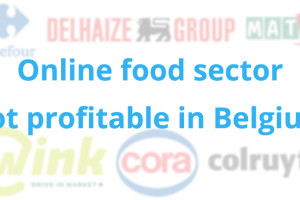Online food sector not profitable in Belgium

It seems impossible to make money online with food sales in Belgium. Well, this probably not only applies to Belgium, but that’s where a new research is conducted and where the conclusion is drawn that not a single distributor manages to make a profit from selling food products online.
Jill Roland, a business engineer at the Solvay Brussels School, analyzed six major grocery retailers in Belgium – Carrefour, Delhaize, Colruyt, Match, Cora and Louis Delhaize Wink – and looked at all the costs these chains made. As Retail Detail writes: “from computers and the additional time it takes staff to handle every order to the required infrastructure (freezers, separate cash register, additional lane, payment booths and so forth).”
And the pessimistic conclusion is that it doesn’t really matter what a distributor chooses to do, whether it’s enabling home delivery, opening pick-up points in stores or building drive-ins, “there is no money to be made selling food products online”.
Too little volume and too high costs
One of the main reasons why this is the case, is there’s just nog enough volume online. Only 1% of food is currently sold online (in other industries the percentage of online sales accounts for about 6 or 7 percent). But also, costs are too high, especially the staff costs. Professor Claude Boffa told the Belgian business newspaper L’Echo: “every hour costs 25 to 30 euros. “But in these online formulas, the distributor is doing the customer’s work, with orders taking up to half an hour. If you do the math: with a 5 to 6 euro contribution, you cannot turn this service into a profitable one. Some chains even pay their staff seven times more for dealing with online orders!”
In an attempt to attract more customers, many retailers also deliver for free when someone orders for over 100 to 150 euros, which happens to seven in ten orders. And of course, in the online supermarkets retailers can’t take advantage of impulse purchases and last-minute decisions, which are strong factors in the physical supermarkets.
All in all, one might raise the question why food retailers and supermarkets are still running their online stores. According to professor Boffa, it has to with the retailer’s image. “In a time when everything and everyone is embracing the internet, you can’t afford to stay behind and leave your customers hanging if you are one of the bigger players. Some also hope this might increase their market share in a saturated market.”
Ideas to make online groceries profitable
The study does not only describe the current online supermarket situation, it also suggests three possible ideas so this sector can be profitable in the near future. One is to offer a service that covers the actual costs, “although that may not be very realistic considering the current price competition”. Another option might be to get bigger volumes so the fixed costs can drop proportionally. And the last suggestion is to offer products with higher margins or products that aren’t readily available offline.

Comments